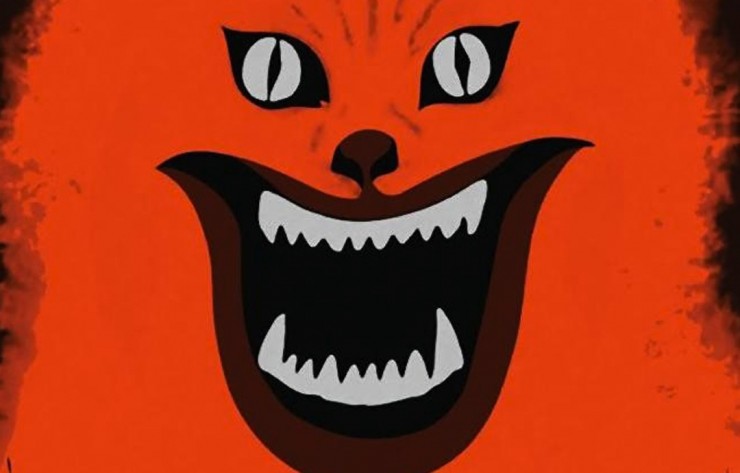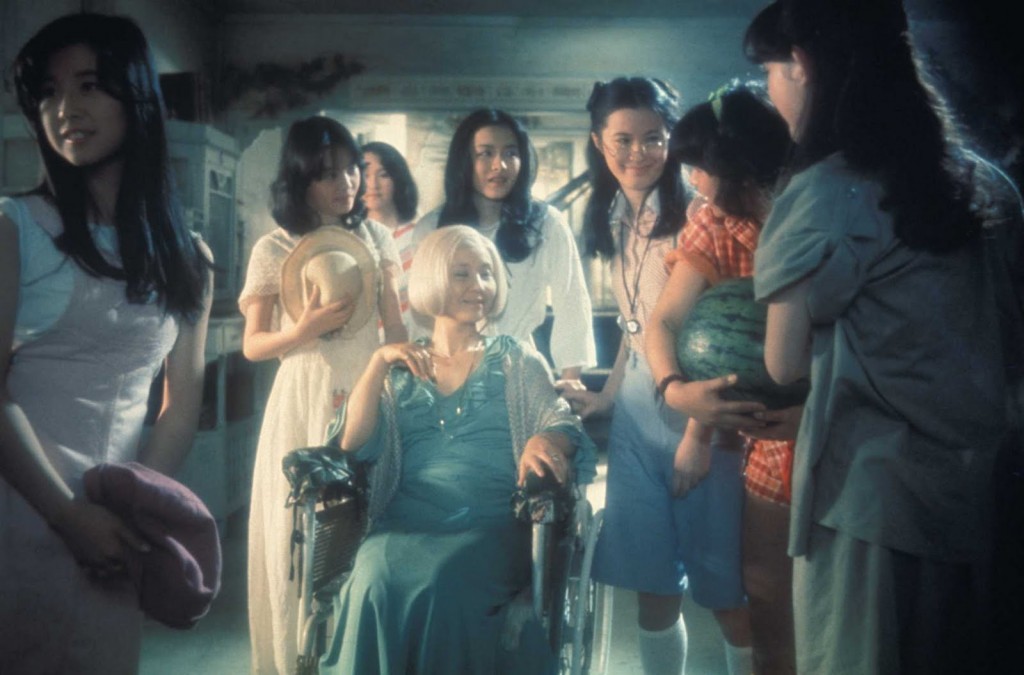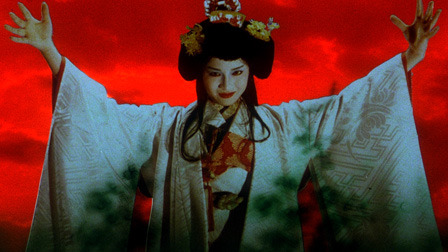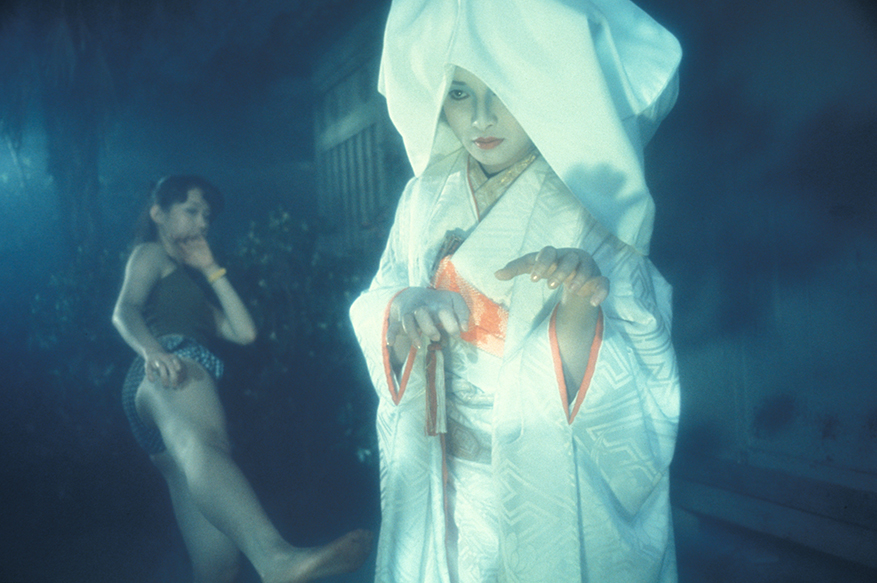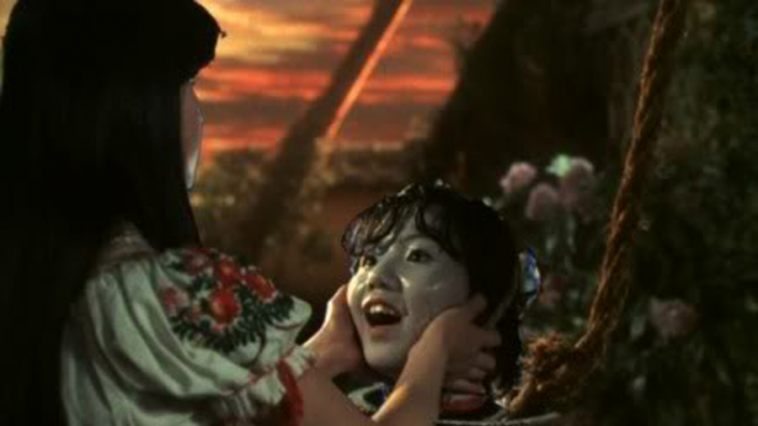“Even after the flesh perishes, one can live in the hearts of others together with the feelings one has for them”
There has never been a haunted house film more simultaneously joyous and creepy as Nobuhiko Obayashi’s 1977 film Hausu (also known as House in the West). Based on ideas given to him by his daughter, Obayashi’s visually striking masterpiece was originally supposed to be the famous Japanese studio Toho’s answer to the film Jaws, but instead turned into something much stranger. Hausu is the story of seven school girls on an unforgettable summer adventure to a wacky haunted house in the Japanese countryside, but it’s also so much more. Multiple dissertations can be written on the film’s colorful use of metaphors and symbolism: the film contains references to the state of post-war Japan, sexual maturity, morality, and martial arts movies, just to name a few. It’s also stunning to see a film produced in 1977 have an overwhelmingly feminine voice. There are at least ten female characters in the film with speaking roles and only two men with true speaking roles that are mostly background. This is definitely a result of Obayashi asking his daughter to conceptualize the movie based on her own fears and in doing so he created a haunted house movie that’s naturally about the joy and subsequent horror of adult maturity and relationships.
The most striking symbolism in Hausu is the repeated use of mirrors or other reflective surfaces. Mirror images are a persistent aspect of most cultural mythologies and this is especially true of horror film, which generally have origins in cultural folklore and tradition. In Japanese folklore, mirrors represent truth because they show the reflection of the soul. The first glimpse we see of this in Hausu is when main protagonist Gorgeous (Kimiko Ikegami) is talking to her father. Her relationship with her dad is strained because he is always away working on Italian films. He has also just remarried a new woman, Ryoko (years after his wife’s death), and Gorgeous isn’t happy with this. The scene is viewed completely through a window pane with bars obscuring the scene and signifying the strain. The stepmother first appears behind the glass which tips off Gorgeous’ dislike for her new mother. Later in the film, Gorgeous is possessed by the ghost of her dead mother whilst looking in a mirror. Gorgeous replaces her grief over her mother’s loss by essentially becoming her mother, even donning her old wedding dress and staying with her aunt’s evil spirit. At the end of the film, she completes the cycle and disintegrates her visiting stepmother with her newfound supernatural powers.
This series of events isn’t inconsequential. At the start of the film, Gorgeous is a childish school girl palling around with her friend Fantasy and asking her teacher if she her arranged marriage was for love. As the movie progresses, Gorgeous begins to behave more maturely. She tells the other girls a story on the train about her mother and in the flashback Ikegami portrays Gorgeous’s mother as a young girl. While at the house, she remains the calmest even when terrifying supernatural manifestations begin. Her final transformation occurs when she puts on her mother’s lipstick in the mirror and sees her mother’s face in a vanity table mirror. Hausu suggests that daughters grow up to be their mothers and, in the case of a loss, this happens sooner than one thinks. In the end, she not only blossoms into an adult but also violently displaces Ryoko, her deceased mom’s ostensible replacement.
The use of white is also quite noticeable in the film. White is most media generally here means purity (or perhaps virginity), but here it’s something of a warning. Gorgeous is the only girl who wears all white at the house, thus signifying her possession by her mother’s ghost later on. The evil aunt’s hair is also stark white, which is an early indicator of her otherworldliness. But most prevalent is the all-white cat Blanche, who is something of a witch’s familiar to Gorgeous’ demonic aunt. Blanche is probably the most memorable part of the film, featured prominently on the poster of the film. It’s also worth noting that the cats typically symbolize feminine characteristics.
All of the girls’ deaths are as humorous as they are unsettling, which seems to be the point of the film. Mac, who has an eating problem, has her head decapitated and transformed into a watermelon, which is eaten by the ghostly aunt. Sweet, the neat freak, is crushed by a floating mattress and then placed inside a grandfather clock. Melody, the piano playing prodigy, is swallowed by a piano, but in reality she also completely merges with the piano, her body parts combining with its innards. The film creates a unique sense of dread from the beginning by creating these bizarre settings that are borderline cartoonish. At certain points, you aren’t sure if someone is about to break out into song or get their leg sliced off. It’s a unique kind of suspense that is a great metaphor for how our brains interpret fears as a child versus those as an adult.
The foundation on which Hausu builds its story is really the relationship between Gorgeous and Fantasy. The pair have a very close intimacy, more so than the other girls, and seem to care for each other very much. Fantasy very much lives up to her namesake, frequently hoping for a man to come sweep her away on a romantic adventure. She, ironically, gets exactly what she wishes but not exactly how she imagined it. In her last scene, Gorgeous, possessed by her mother, encounters Fantasy in the house, which has now filled up with blood. Fantasy seems relieved until seeing Gorgeous exposing her fully matured breasts. It’s a bizarre sequence that ends with Gorgeous cradling Fantasy like a mother but also somewhat like a lover. This type of psychosexual imagery defines Hausu as haunting experience like no other, filled to the brim with frightful yet familiar imagery that sticks with you.

